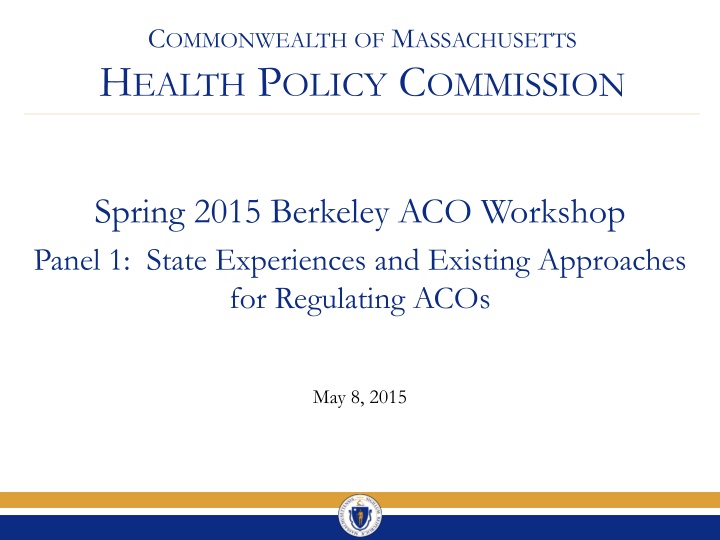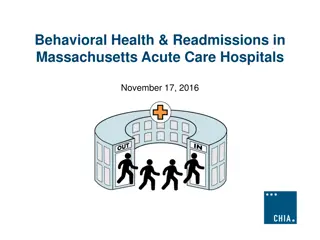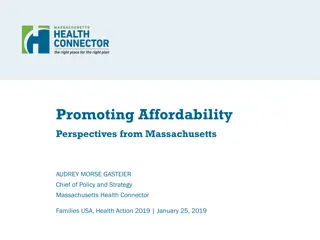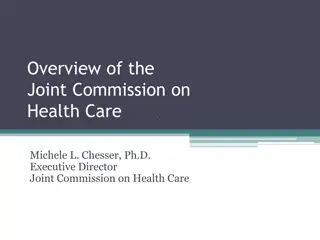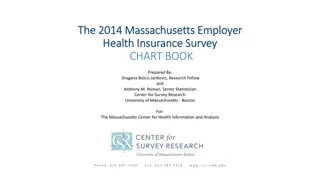Massachusetts Health Policy Commission Overview
This content provides an in-depth look at the journey of health care reform in Massachusetts, highlighting key milestones, initiatives, and the role of the Health Policy Commission (HPC). It discusses the state's efforts in transforming care delivery, payment systems, and fostering a transparent, accountable health care system for residents. The responsibilities and objectives of the HPC are outlined, emphasizing the focus on controlling costs, improving quality, and promoting innovative care models.
Download Presentation

Please find below an Image/Link to download the presentation.
The content on the website is provided AS IS for your information and personal use only. It may not be sold, licensed, or shared on other websites without obtaining consent from the author.If you encounter any issues during the download, it is possible that the publisher has removed the file from their server.
You are allowed to download the files provided on this website for personal or commercial use, subject to the condition that they are used lawfully. All files are the property of their respective owners.
The content on the website is provided AS IS for your information and personal use only. It may not be sold, licensed, or shared on other websites without obtaining consent from the author.
E N D
Presentation Transcript
COMMONWEALTH OF MASSACHUSETTS HEALTH POLICY COMMISSION Spring 2015 Berkeley ACO Workshop Panel 1: State Experiences and Existing Approaches for Regulating ACOs May 8, 2015
How we got here: Massachusetts health care reform at a glance 1990s Insurance market reforms Guaranteed issue Modified community rating Pre-existing condition limitations 2006 Expansion of insurance coverage (Chapter 58 of the 2006 Acts) Individual mandate Employer responsibility Medicaid expansion Insurance exchange 2008 Health Care Transparency and e-Health (Chapter 305 of the 2008 Acts) New state authority to examine cost drivers/conduct cost trend hearings Support for electronic medical records and information sharing Small Business Health Care Relief (Chapter 288 of the 2010 Acts) Increased transparency Development of tiered/limited network products Reform of unfair contracting practices 2010 2012 Health Care Cost Containment (Chapter 224 of the 2012 Acts) Formation of the independent Health Policy Commission (HPC) - Governed by an 11-member board with diverse experience in health care - Mission: to promote informed dialogue, evidence-based policy, and innovative models to foster transformation through ongoing evaluation of the Massachusetts health care system Health Policy Commission | 2
Vision of chapter 224 of the acts of 2012 Transforming the way we deliver care 1 Reforming the way we pay for care 2 A more transparent, accountable health care system that ensures quality, affordable health care for Massachusetts residents Developing a value-based health care market 3 Engaging consumers and employers through information and incentives 4 Health Policy Commission | 3
Key Health Policy Commission (HPC) responsibilities Establish annual statewide health care cost growth benchmark and analyze and report on health care cost drivers Monitor the composition and functioning of health care provider organizations in Massachusetts Cost trends report CMIR report on PHS/SSH RPO regulations Program design and evaluation plan for phased implementation of PCMH certification ACO certification Innovation investment program DPH health planning support Promote the adoption of new delivery system models through a certification program for patient-centered medical homes and accountable care organizations Assess the impact of health care market changes on cost, quality, and access Invest in the Commonwealth s community hospitals to establish the foundation necessary for sustainable system transformation Oversee the development and implementation of performance improvement plans by health care market participants Health Policy Commission | 4
Key HPC responsibilities most directly related to ACOs Establish annual statewide health care cost growth benchmark and analyze and report on health care cost drivers Registration of Provider Organizations (RPO) Monitor the composition and functioning of health care provider organizations in Massachusetts Cost and Market Impact Reviews (CMIRs) Cost trends report CMIR report on PHS/SSH RPO regulations Program design and evaluation plan for phased implementation of PCMH certification ACO certification Innovation investment program DPH health planning support Promote the adoption of new delivery system models through a certification program for patient-centered medical homes and accountable care organizations Assess the impact of health care market changes on cost, quality, and access Invest in the Commonwealth s community hospitals to establish the foundation necessary for sustainable system transformation ACO Certification Oversee the development and implementation of performance improvement plans by health care market participants Health Policy Commission | 5
Overview of registration of provider organizations (RPO) program RPO collects key information regarding the operations and structure of provider organizations, e.g. ownership, contracting and clinical relationships, facilities and sites, rosters of physicians. All Provider Organizations which receive significant commercial revenue or which enter into contracts with downside risk (risk-bearing provider organizations or RBPOs) are required to register with the HPC. Related annual reporting to the Center for Health Information and Analysis (CHIA) includes additional information about provider financial condition, organizational structure, business practices and market share. RPO contributes to a foundation of information needed to support health care system monitoring and improvement. This regularly reported information on the health care delivery system supports: Care delivery innovation Evaluation of market changes Health resource planning: assessing capacity, need, utilization Tracking and analyzing system-wide and provider-specific trends Health Policy Commission | 6
Overview of cost and market impact reviews (CMIRs) The HPC tracks proposed material changes to the structure or operations of provider organizations and conducts cost and market impact reviews (CMIRs) of: 1. Transactions anticipated to have a significant impact on health care costs or market functioning 2. Providers identified as having excessive cost growth relative to the statewide cost growth benchmark What it is not What it is Differs from Determination of Need reviews by Department of Public Health Comprehensive, multi-factor review of the provider(s) and their proposed transaction Following a preliminary report and opportunity for the providers to respond, the HPC issues a final report CMIRs promote transparency and accountability, encouraging market participants to address negative impacts and enhance positive outcomes of transactions Proposed changes cannot be completed until 30 days after the HPC issues its final report, which may be referred to the state Attorney General for further investigation Distinct from antitrust or other law enforcement review by state or federal agencies Health Policy Commission | 7
Metrics for evaluating the impact of provider changes Unit prices Health status adjusted total medical expenses Provider costs and cost trends Provider size and market share within primary service areas and dispersed service areas Quality of services provided, including patient experience Availability and accessibility of services within primary service areas and dispersed service areas Impact on competing options for health care delivery, including impact on existing providers Methods used to attract patient volume and to recruit or acquire health care professionals or facilities Role in serving at-risk, underserved, and government payer populations Role in providing low margin or negative margin services Consumer concerns, such as complaints that the provider has engaged in any unfair method of competition or any unfair or deceptive act Other factors in the public interest Cost M A R K E T F U N C T I O N I N G Quality Access Public Interest Health Policy Commission | 8
Exemplar questions for evaluating impact Costs Quality Access Are any changes in services identified? How do these changes affect any shortages or oversupply of services? Will contractual prices change as a result of the transaction? Will care shift to lower or higher priced providers? What are the identified areas for quality improvement? What changes do the parties propose to address these areas? What do we know from the terms of the transaction? How are the parties aligning incentives? Does the proposed structure support greater clinical integration and population care management? Will the resulting organization have higher or lower government payer mix? Higher or lower mix of low/negative margin services? Will market share or concentration increase or decrease? What is the anticipated impact on bargaining leverage? How will provider and market structure change? Continued evaluation with additional data, production, and interchange with parties and market participants. E.g., Are the parties plans internally consistent and/or supported by historic results? Are proposed changes both necessary and sufficient to improve cost, quality, and access? Are cost savings likely to be passed on to purchasers (employers and consumers)? Ongoing evaluation of the parties goals and plans Health Policy Commission | 9
Types of transactions noticed April 2013 to Present Number of Transactions Type of Transaction Frequency Physician group merger, acquisition or network affiliation 11 29% Acute hospital merger, acquisition or network affiliation 8 21% Clinical affiliation 6 16% Formation of contracting entity 5 13% Merger, acquisition or network affiliation of other provider type (e.g. post-acute) 4 11% Change in ownership or merger of corporately affiliated entities 3 8% Affiliation between a provider and a carrier 1 3% Health Policy Commission | 10
Examples of HPC market monitoring work in 2013-14 Four Cost and Market Impact Reviews Conducted Two Court Submissions Regarding Proposed Expansion by Partners HealthCare System Health Policy Commission | 11
Overview of ACO Certification Program Chapter 224 requires the HPC to establish a process for certain registered provider organizations to be certified as accountable care organizations and to update the certification standards at least every two years Certification is voluntary, and is available for ACOs participating in commercial, Medicare, and Medicaid contracts The statute identifies minimum standards for ACOs related to governance structure, payment methodologies, health IT, consumer protection, behavioral health integration, price transparency, and patient shared decision-making The statute also permits the HPC to set additional standards based on 15 additional goals related to cost containment, quality improvement and consumer protection The statute does not include any change to existing laws relating to market competition (i.e. ACOs are not immunized from antitrust enforcement) Health Policy Commission | 12
Statutory goals for ACO certification (1) Reduce growth of health status adjusted total medical expenses (2) Improve quality of health services using standardized measures (3) Ensure access across care continuum (4) Promote alternative payment methods and incentives to drive quality and care coordination Cost (5) Improve access to primary care services containment (6) Improve access for vulnerable populations (7) Promote integration of behavioral health into primary care (8) Promote patient-centeredness (9) Promote health information technology uptake Patient protection Quality improvement (10) Demonstrate excellence in care coordination and chronic disease management (11) Promote protocols for provider integration (12) Promote community based wellness programs (13) Promote health of children (14) Promote worker training programs (15) Adopt governance structure standards, including those related to financial conflicts of interest and transparency Health Policy Commission | 13
Contact information For more information about the Health Policy Commission: Visit us: http://www.mass.gov/hpc Follow us: @Mass_HPC E-mail us: HPC-Info@state.ma.us Health Policy Commission | 14
